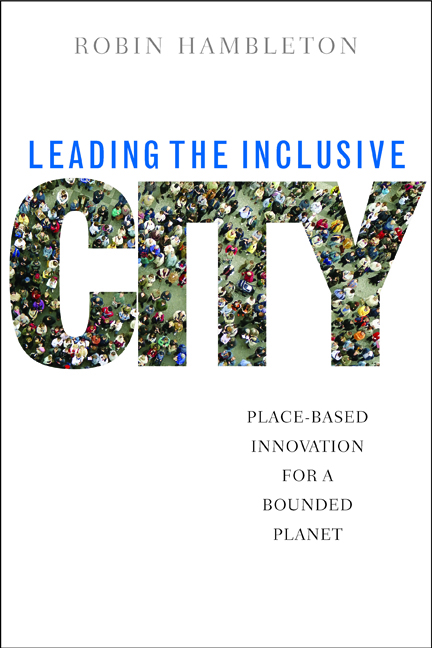Book contents
- Frontmatter
- Dedication
- Contents
- List of figures
- List of innovation stories
- About the author
- Preface
- A guide to the book
- Overview
- Part 1 Diagnosis: Understanding trends and challenges
- Part 2 Concepts: Place, leadership, innovation and democratic governance
- Part 3 Experiences: Place-based leadership in action
- Part 4 Lesson drawing: Insights and international learning
- Notes
- Appendix: International city networks and resources
- Acknowledgements
- References
- Index
Seven - Democratic urban governance
Published online by Cambridge University Press: 08 March 2022
- Frontmatter
- Dedication
- Contents
- List of figures
- List of innovation stories
- About the author
- Preface
- A guide to the book
- Overview
- Part 1 Diagnosis: Understanding trends and challenges
- Part 2 Concepts: Place, leadership, innovation and democratic governance
- Part 3 Experiences: Place-based leadership in action
- Part 4 Lesson drawing: Insights and international learning
- Notes
- Appendix: International city networks and resources
- Acknowledgements
- References
- Index
Summary
Sicinius Velutus: ‘What is the city but the people?’ Citizens: ‘True. The people are the city’
William Shakespeare, Coriolanus, Act III, Scene I (circa 1608)Introduction
A central argument of this book is that the reach of place-less power is expanding and that this is bad news for local communities. The behaviour of place-less, unaccountable decision makers is creating divided societies across the world. Why is this the case? Because these decision makers neglect the social calculus. They do not believe it is important to consider the consequences for particular communities of the decisions they make.
This is an extraordinary state of affairs – one that has been highlighted with painful clarity by the global financial crash of 2008/09. The distant decision makers in the big financial institutions and multi-national companies have been shown to be completely out of touch with social reality. They need, and this is a massive challenge for them, to rethink their values and raison d’etre so that they can become organisations that understand the importance of local communities. Societal progress requires them to shift from exploiting people to serving them. This may seem to be an ambitious task, but there are many voices arguing for a push towards more responsible forms of capitalism, ones that recognise the resourcefulness of all communities and ones that generate local wealth and prosperity. It is my argument that successful efforts to change societies from a culture of exploitation to a culture of service will require a significant expansion of place-based power.
Local governments can be expected to be key players in bringing about this new social order. Indeed, they are already doing this. This chapter explains why strong local democracy has a vital role to play in rebuilding the power of place in modern societies. First, I recap on the problems associated with the exercise of place-less power. Second, I ask: What is local government for? This is a big subject but it is important to go back to fundamentals. Third, I discuss the various dimensions of democracy and consider the possibilities for combining representative and participatory democracy. Fourth, and now the argument becomes more specific, I examine options for the institutional design of local governance.
- Type
- Chapter
- Information
- Leading the Inclusive CityPlace-Based Innovation for a Bounded Planet, pp. 173 - 204Publisher: Bristol University PressPrint publication year: 2014



